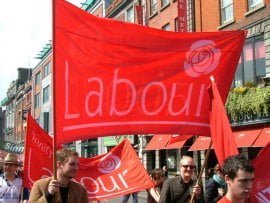A small leftward shift within Young Labour was detectable at this year’s national conference, held in Leicester on 2-3 March 2013. However, there is stil a way to go in the struggle for the democratic structures and socialist policies that Young Labour needs in order to become a fighting organisation for young workers and students in Britain.
The weekend of the 2nd-3rd March 2013 saw several hundred members of Young Labour attend their National Conference in Leicester. Young people have been the worst hit by the global crisis of the capitalist system and the youth have been at the forefront of anti-austerity and revolutionary movements around the world in recent years. On the basis of these events a small leftward shift within Young Labour was detectable at this year’s conference. However there is a lot of work to do before Young Labour, as the youth wing of Britain’s only mass democratic socialist party, can call itself either democratic or socialist. Only within democratic structures and with socialist policies can Young Labour fight and win on behalf of workers and youth in Britain.
Much of the conference was given over to elections, and most of the remaining time was given over to speeches by Labour Party leadership figures. The youth who join Young Labour do so because they want to discuss politics and because they want to fight the Coalition’s cuts in a meaningful way. As Socialist Appeal supporters pointed out over the course of the weekend, the complete absence of any policy motions at the conference, just a month before another round of spending cuts that will fall heavily on young people, is extremely disappointing.
Many of the candidates for election to various positions within Young Labour did not inspire. Some candidates mentioned ideas such as nationalisation of the railways, the raising of strike funds by Young Labour and the strengthening of the trade union and Labour link. Despite the fact that it was these left policies that drew the most enthusiastic applause, none of the candidates put forward a coherent argument against all cuts and for socialist policies, based on the nationalisation and democratic control of the key sectors of the economy. Ultimately it was the candidates of the Right who were elected, demonstrating that overall the composition of the conference is still to the right and in support of the Party leadership.
The Labour Party organising committee attempted to ban all leafleting and stalls that had not been pre-approved and paid for in advance of the conference. Such an attempt to stifle political ideas and debate – other than the ideas of the leadership – drew widespread condemnation from many within Young Labour. Furthermore during one of the few sessions at which delegates were able to talk about their own political opinions, the ‘Big Ideas’ debate, a bizarre attempt by the organisers to trivialise the importance of political discussion by interspersing the debate with joke-telling was met with anger by delegates.
The angry reaction to the attempt to cut off all meaningful political discussion demonstrates that many within Young Labour recognise the need to have a fully democratic organisation that can debate and set its own policy. This was also reflected by delegates’ interest in the fringe event run by Socialist Appeal, entitled “The Militant Fight Against Cuts”. This was one of the few sessions over the weekend at which politics was discussed. John Dunn, an ex-miner and former Clay Cross councillor, told the meeting about his council’s refusal to raise rents in Clay Cross in 1972 in defiance of the Tory central government. John’s passionate and militant speech, and the interesting political discussion that followed, was a welcome change from most of the rest of the conference sessions.
Socialist Appeal supporters were able to question Gloria de Piero, shadow Home Office Minister, on the situation of the Labour councillors in Hull who are defying Coalition cuts. In response the conference was told that it was fine to be idealistic in our youth, but when we grow up we’ll realise the importance of pragmatism. Such a patronising attitude to left-wing ideas demonstrates just how much work still needs to be done to transform the leadership of the Party into one that is willing to lead the fight that is necessary against austerity.
Support for Len McClusky’s talk of nationalisation of the banks and the possibility of a general strike, as well as arguments for a planned economy as the only realistic way to fund free education, received a small echo amongst the delegates. As events unfold in Britain and the effects of this crisis are felt ever more acutely, such ideas will gather momentum within organisations like Young Labour. The conclusion reached by many young people in Greece and other European countries – that there is no way out of the crisis under capitalism – will be increasingly raised and debated in Young Labour. Although the organisation is currently still dominated by right-wing cliques, the trend is clearly leftward and for that reason we can be optimistic about the future of Young Labour.
A lack of democratic structures for policy making and the exchange of ideas is the most immediate problem facing Young Labour at the present time. As a matter of urgency the organisation needs to be allowed to debate, pass and implement its own policy every year at the national conference.
Such democratic structures are what is needed to transform Young Labour into a fighting and campaigning organisation; one which is capable of fighting for an alternative to austerity and capitalist crisis. This is how Young Labour will attract new layers of youth and this is the only way in which we can fight for a genuine transformation of society along socialist lines.






